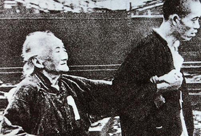 Martenitsa adds glamour to Bulgarian Embassy
Martenitsa adds glamour to Bulgarian Embassy
 Mysterious 'Dolan Tribe' in Xinjiang
Mysterious 'Dolan Tribe' in Xinjiang
 This is Shanghai
This is Shanghai
 Female attendants serving 'two sessions'
Female attendants serving 'two sessions'
 The many tears of DiCaprio
The many tears of DiCaprio
 Dan Dan's bittersweet opera life
Dan Dan's bittersweet opera life
 A dream wedding for a girl suffering from cancer
A dream wedding for a girl suffering from cancer
 Old photos of Anti-Japanese War (1937-1945)
Old photos of Anti-Japanese War (1937-1945)
 This is Beijing – Nanluoguxiang
This is Beijing – Nanluoguxiang
Although China's 7.5 percent growth target is the same as last years, its importance is fading as many believe the government will no longer view the figure as the necessary minimum.
"We should keep economic performance within a proper range," Permier Li Keqiang said in the government work report to China's top legislature on Wednesday.
The range -- a lower limit to ensure steady growth and job creation, an upper limit to avert inflation -- written in the government work report for the first time was seen as China's new strategy of balancing growth and reform.
In practice, China usually overshoots its growth target. Last year growth came in at 7.7 percent, but there is increasing tolerance of a slower pace.
At a press conference on the sidelines of the annual session of the National People's Congress on Thursday, Finance Minister Lou Jiwei downplayed the figure.
"Whether the final figure is at a touch more or less than the target is not that important. Employment is the key," he said, adding a growth of 7.3 percent or 7.2 percent can still be counted within the acceptable range.
For those who want the government to ditch targets entirely and worry about reform instead, Li's report may be a little disappointing, but China needs stable growth to create enough jobs to guarantee the relocation of the rural labor force to the cities.
"China's demographics are changing so it does not need to grow as fast as in the past. There are still many rural people with low incomes and 7 million college graduates per year looking for jobs, making a moderately fast pace of growth necessary," noted David Dollar, a senior fellow with the Washington's Brookings Institution.
According to Li's report, some 7.27 million college graduates will be job hunting in 2014, and another 10 million people are to be lifted out of poverty.
Despite good recent economic performance, many people still live in harsh conditions. With China's poverty line drawn at 2,300 yuan of annual net income last year, a rural population of 82.5 million were officially poor.
"China is still a developing country... It must keep economic development as the central task," the premier has stressed.
Promising stable growth does not mean compromising reform. Rather, it sets favorable conditions for speeding up the economic overhaul."Reform is the top priority this year," Premier Li.
Among the plans for 2014, Li announced a deposit insurance system, considered a precondition for freeing deposit rates. It is probably the last and most important step of interest rate liberalization.
China will also overhaul the current system for local government to issue bonds to contain the mounting debt problem. There are detailed measures to cut overcapacity, a major drag on the economy.
In a range of steps to address public concerns, Li also "declared war" on pollution and promised severe treatment for crooked officials "without mercy".
"As we had expected, relatively easy reforms and those with the broadest consensus, will go at a faster pace in the near term," said Wang Tao, chief China economist at UBS.
Relatively ambitious GDP growth will likely limit the room the government has for maneuverer, as it struggles with local government debt and financial leverage and other serious reforms, Wang cautioned, expecting more painful reforms to go at a slower pace.
UBS forecast China's 2014 growth to reach 7.8 percent.
 Chaihe village, pure and peaceful fairyland in snow
Chaihe village, pure and peaceful fairyland in snow Belgians warmly welcome arrival of China's giant pandas
Belgians warmly welcome arrival of China's giant pandas Female marines receive tactical training in NW China
Female marines receive tactical training in NW China Blood memory: Nanjing Massacre in 1937
Blood memory: Nanjing Massacre in 1937 Top 10 pure beauties in showbiz
Top 10 pure beauties in showbiz British WWII veteran: I can't forgive Japan
British WWII veteran: I can't forgive Japan Tongban's dream of prosperity
Tongban's dream of prosperity Chinese frigate Yancheng holds drills in Mediterranean Sea
Chinese frigate Yancheng holds drills in Mediterranean Sea A visit to comfort woman's home in South Korea
A visit to comfort woman's home in South Korea Fairyland? Qingdao in sea of clouds
Fairyland? Qingdao in sea of clouds Top 10 most handsome faces in Asia in 2013
Top 10 most handsome faces in Asia in 2013 Female celebs with beautiful long legs
Female celebs with beautiful long legs Cat 'guardians' in Forbidden City
Cat 'guardians' in Forbidden City Large numbers of ancient coins excavated in Inner Mongolia
Large numbers of ancient coins excavated in Inner Mongolia Leisurely life beneath Zhonggulou, where time travels slower
Leisurely life beneath Zhonggulou, where time travels slowerDay|Week|Month